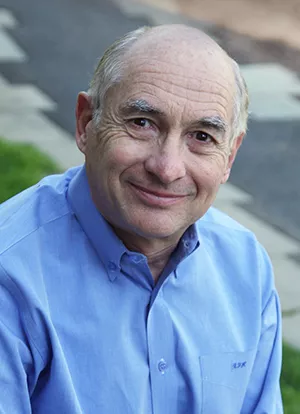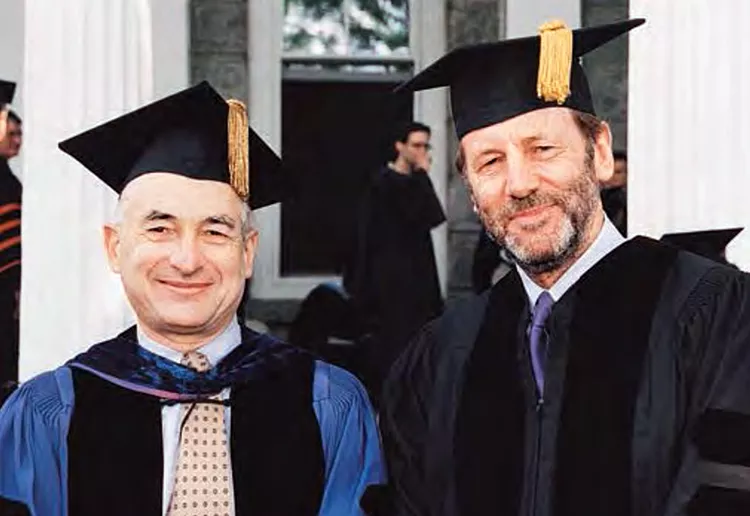In Honor of Professor Emeritus of Political Science Ray Hopkins

President Valerie Smith shared the following message with the campus community on June 6, 2023:
Dear Friends,
With deep sadness, I write to share the news that Raymond Frederick Hopkins, the Richter Professor Emeritus of Political Science, died peacefully in Media on May 23. He was 84.
Ray, who served on the faculty for 40 years, is remembered as a prolific and internationally influential scholar and pioneer in the study of world food policy whose generosity and love for teaching endeared him to students and colleagues alike.
Ray is survived by Carol, his wife of 61 years, children Kathryn and Mark, and four grandchildren. A memorial will take place on Saturday, Aug. 26, at 11 a.m. at the Swarthmore Presbyterian Church, with a reception to follow. In lieu of flowers, the family welcomes donations in Ray’s memory to the Hopkins International Public Policy Internship and the Chester Children’s Chorus.
I invite you to read more below about Ray and his many contributions to our community.
Sincerely,
Val Smith
President
In Honor of Professor Emeritus of Political Science Ray Hopkins
Raymond F. Hopkins, the Richter Professor Emeritus of Political Science, died Tuesday, May 23, at age 84. With his passing, Swarthmore has lost a widely accomplished scholar, devoted teacher and mentor, warm colleague, and dear friend.
“Ray was a superb scholar of international political economy who reached beyond the academy, shaping food policy at the United Nations, the World Bank, and elsewhere,” says Professor and Chair of Political Science Dominic Tierney. “He was also a wonderful presence in the department: He cared passionately about students, had a great sense of humor and always had a twinkle in his eye.”
“At a time when many viewed international institutions and governance as weak and peripheral to the major issues of politics in the twentieth century,” says Richter Professor of Political Science Tyrene White, “Ray Hopkins stood out for his consistent and determined focus on the international food aid regime and its potential for addressing persistent problems of hunger, famine, and food distribution systems.”
“I loved discussing these issues with Ray, but I best remember him as a wonderful colleague and teacher,” says William R. Kenan Jr. Professor Emeritus of Political Science Ken Sharpe. “Ray was always willing to soothe and solve conflicts and to brainstorm solutions for conundrums we faced. He was empathetic and compassionate when dealing with sensitive student issues. That stance came from the deep caring he had for them.”
Hopkins was born in Cleveland, Ohio, and majored in philosophy at Ohio Wesleyan University, graduating with a bachelor’s in 1960. The following year, he studied theology at Yale Divinity School. While enrolled in classes, he served as an assistant pastor at Newfield Methodist Church in Bridgeport, Conn., and as a volunteer aide at the Yale New Haven Psychiatric Hospital. But Hopkins shifted his focus to political science, earning a master’s from Ohio State University before returning to Yale for a master’s and a Ph.D. in the subject. His dissertation became his first book, Political Roles in a New State: Tanzania's First Decade (Yale University Press, 1971).
Hopkins’ shift from theology to political science makes sense to his colleagues, who see a direct line from his ethical values and sense of decency to how deeply he cared about food security and eradicating hunger.
“I suspect that Ray's finest qualities were given voice when he first enrolled at Yale,” White says. “He ultimately chose a different career path, but his warm and caring nature and his desire to help those in need traveled with him to Swarthmore.”
Hopkins came to Swarthmore directly from graduate school in 1967 and taught classes on international politics, African politics, and food policy. He also became an early champion of interdisciplinary study, collaborating in the mid-1970s with colleagues in religion and physics to introduce a team-taught course, “Arms Control and Disarmament.” Incorporating what proved to be enduring aspects of his pedagogy, the course featured visits from outside specialists and policymakers, and encouraged students to include field work in the independent research projects which constituted an important part of their work.
A few years later, Hopkins worked with former Provost Chuck Gilbert, Rob Hollister in economics, and others to build these features into a new interdisciplinary program in public policy that featured a summer internship and thesis. Hopkins served as the program coordinator for several years, in addition to his three stints as chair of the Political Science Department.
“His intellectual instincts were collaborative and problem-based, and in both respects he was way ahead of his time,” says Gil and Frank Mustin Professor of Economics Steve O’Connell who, like Hopkins, spent formative time in Tanzania early in his career. “When I arrived at Swarthmore, this became an instant bond between us,” O’Connell says, “reinforced through Ray’s characteristic kindness to junior colleagues and his broad interests in the social sciences.”
Over his career, Hopkins authored, co-authored, or edited seven books, including Global Political Economy of Food (University of Wisconsin Press, 1978), Global Food Interdependence: Challenge to American Foreign Policy (Columbia University Press, 1980), and Food in the Global Arena: Actors, Values, Policies, and Futures (Holt, Rinehart, and Winston, 1982). He also published more than 60 academic articles and several dozen book reviews, and delivered more than 40 papers at professional conferences.
Hopkins’ food security research took him around the world — including Bhutan, Egypt, Ghana, Italy, Ivory Coast, Kenya, Mozambique, the Philippines, and Thailand — and made him a highly sought authority on the subject. He frequently worked with U.N. agencies such as the Food and Agricultural Organization and the World Food Programme, as well as with the World Bank, the U.S. State Department, and the U.S. Agency for International Development, among others. He served twice as a delegate to the U.N. World Food Summit, in 1996 and 2002. Hopkins also testified before Congress on four separate occasions on problems of foreign policy and international food aid, and he helped shape legislation reforming U.S. food aid in the 1990 farm bill.
“Although his record of publication and international service placed him among the most accomplished scholars of his generation,” White says, “Ray was devoted to his students and loved teaching.”

Hopkins (left) and Denis Halliday H'02 at Commencement in 2002.
That devotion, and Hopkins’ influential belief in the importance of engaging in public policy work, ultimately attracted a generation of students to those efforts. With his vast network of contacts, Hopkins connected scores of students with policy experts in Washington, as well as with policy-related internships, both in the U.S. and overseas.
“Ray and his political science colleague David Smith often joined us economists,” says Joseph Wharton Professor of Economics John Caskey, “to encourage students interested in public policy to take an interdisciplinary approach and to get practical experience working in public policy organizations.”
Remarkably, Hopkins also continued those efforts amid his own research trips.
“The year Ray had a Fulbright in Italy, he took students to the U.N.’s Geneva office and to its Food and Agricultural Organization in Rome, hosted dinners, and made sure students got to the beach,” says Richter Professor Emerita of Political Science Carol Nackenoff. “Ray was always inventive in generating these and other opportunities that expanded his own and his students’ educational horizons.”
An international public policy internship at the College, named fittingly for Hopkins, supports students interested in policy issues of global significance, working within a public or nonprofit organization. Perhaps not surprisingly, a strong preference is given for experience in internships overseas.
Hopkins even founded a nonprofit to further support international engagement. For more than 10 years, he served as president of the International Service Community, which arranged for groups of professionals to go abroad to do volunteer work.
Over the years, Hopkins received support for his work, including on global food issues and political economy, from virtually every nationally significant funding organization, including the Guggenheim Foundation, the National Endowment for the Humanities, the National Science Foundation, the National Academy of Sciences, the Rockefeller Foundation, and the American Philosophical Society, among others. He served as a fellow at the Woodrow Wilson International Center for Scholars; held faculty research appointments at Harvard University, Stanford University, the University of Indiana, University of Nairobi, and University of Dar es Salaam; and held visiting professorships at Columbia University, Princeton University, and the University of Pennsylvania. His professional service included various leadership roles on editorial boards and in professional associations.
Hopkins also devoted considerable time to his local community. He served two terms as president of the Swarthmore Democratic Committee and as a ruling elder of the Swarthmore Presbyterian Church, among other organizations.
To mark his retirement in 2007, some of the nation’s leading scholars in international politics convened on campus for a two-day symposium, "Anti-Americanism, Failing States, and American Foreign Policy: Challenges in Contemporary International Politics.” One of the panelists, Claude C. Smith Professor Emeritus of Political Science Jim Kurth, has warm memories of more than 50 years of conversations with his longtime colleague.
“Ray always had an active, inquiring, and innovative mind,” Kurth says. “I left our discussions having learned something new and important, or thinking about a seemingly familiar topic in a new and fertile way.”
After he retired, Hopkins remained active in the department and the College, welcoming new faculty and offering friendly advice.
Professor of Political Science Ayse Kaya, who joined the department in 2008, says Hopkins greeted her on one of her first days on campus. “Later that year, I had the fortune of co-teaching with him for a few weeks,” she says. “It was nerve-wracking in my very first year to teach parts of an Honors seminar with someone who had taught it for decades, but Ray never treated me as a newbie and had great counsel.”
“He thought about the social cohesion of the department,” says Nackenoff, who remembers being welcomed herself to informal dinners at the Hopkins’ Ogden Avenue home when she first arrived on campus. “Ray and Carol also hosted our annual holiday party for many years, as well as a number of presidential election night parties and seminar meetings.”
“Ray was a leavening presence on a sometimes too-serious campus,” O’Connell says. “Laughter was part of every conversation with Ray, and no encounter would end without a ‘Ciao!’ that, from Ray, always seemed an invitation to meet again, and soon.”
“My life has been much richer because of his ongoing presence in it,” Kurth says. “I miss him now, and I will continue to miss him.”
While in his 70s, Hopkins achieved his goal of sailing the Atlantic Ocean. He also climbed Mt. Kilimanjaro, which he proudly included in his LinkedIn profile.
Reflecting on his pending retirement, Hopkins once told an interviewer, “I’ve lived a wonderful life.” He also offered this advice: “When in doubt, do it.”



